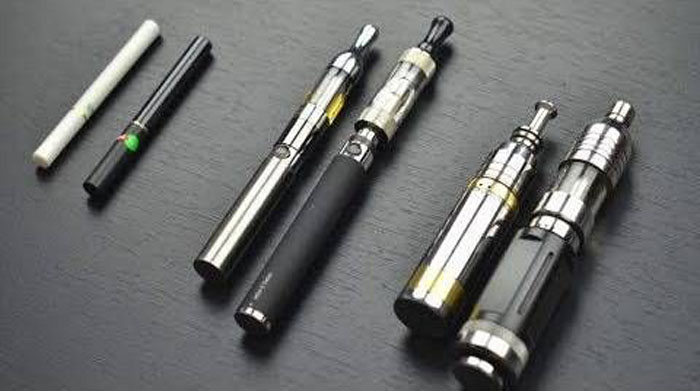Health fears stoke regulations on ‘vaping’
Published 4:00 pm Monday, July 20, 2015

- E-cigarettes
BOSTON – Jonathan Smith smoked cigarettes for more than 13 years, burning through a pack a day, until he decided two years ago to take up electronic cigarettes and nicotine “vaping” to kick the habit.
Smith, 34, said he hasn’t touched a regular cigarette since then, and his health has vastly improved.
“It saved my life,” said Smith, now a manager at the Vapor Outlet in downtown Salem. “The smoking was killing me, slowly but surely. Vaping just worked for me, and it has for a lot of other people, too.”
Despite Smith’s story and anecdotes like it, health advocates remain concerned about vaping’s effects and skeptical of its effectiveness as a smoking cessation tool. Debate is raging on Beacon Hill over attempts to strap tough new regulations on the burgeoning industry.
Businesses that range from shopping mall kiosks to big tobacco companies like R.J. Reynolds are pushing back. They argue that the products are safe alternatives to tobacco smoking that shouldn’t be over-regulated or taxed.
“Every month, more studies emerge showing that vapor products are far less hazardous than smoking for users, pose no significant risk to bystanders, and are effective at helping smokers kick the habit,” said Greg Conley, president of the American Vaping Association. “These devices are not tobacco products, and treating them as such sends the absolute wrong message.”
Public health officials disagree. They want the state to regulate e-cigarettes like other tobacco products by setting age limits for sales, requiring disclosure of potential toxins and banning “vaping” indoors and in public places.
One proposal, by Senate Majority Leader Harriette Chandler, D-Worcester, prohibits the sale of e-cigarettes and vaping products to anyone under 18 and sets requirements similar to those for tobacco products. Her proposal is backed by more than two dozen lawmakers.
Chandler said new vaping stores are proliferating across the state, eroding years of anti-smoking efforts by health officials that have largely curbed tobacco use among youth.
“We have a whole new industry going, and it’s a frightening industry,” she told a legislative committee on Tuesday. “What we thought we were done with is back in a different form.”
Sen. Barbara L’Italien, D-Andover, is co-sponsoring several bills, including one that would require the manufacturers of e-cigarettes to file annual reports to the health department identifying any toxins contained in e-cigarette and vapor products.
“Equipping the public with this information gives them the power to make an informed decision about their health,” L’Italien said.
Other legislation requires the liquid nicotine used in e-cigarettes to be sold in child-resistant packaging and forces manufacturers to disclose any toxins in their products.
“There is broad consensus that we need regulations,” said Rep. Jonathan Hecht, D-Watertown, the sponsor of two bills. “Having spent a lot of time, money and effort to keep kids from getting hooked on cigarettes, it would be a tragedy if e-cigarettes allow another generation to get hooked on nicotine.”
Traditional e-cigs are battery-powered devices that heat a liquid nicotine solution in a self-contained, disposable cartridge. That creates a vapor that is inhaled by a user.
The liquid capsules that are inserted into cartridges come in a variety of flavors, including fruits and candy. The main ingredients of most products are nicotine, flavoring and propylene glycol.
Public health advocates say the potential health consequences of inhaling the vapors are yet unknown.
“We really don’t have enough science yet,” said Dr. Stephen Epstein, a physician at Beth Israel Deaconess Hospital and member of the Massachusetts Medical Society. “We know that nicotine is a very addictive, harmful substance, but who knows what else is in this stuff? We think the public has a right to know.”
Health officials are also concerned that e-cigarettes could spur teen tobacco use, undermining efforts to reduce smoking. In 2013, at least 10 percent of high school students said they had tried e-cigarettes, up from 4.7 percent a year earlier, according to a U.S. Centers for Disease Control and Prevention survey.
On its website, the federal Food and Drug Administration points out that health effects of e-cigarettes have not been studied enough to determine if they are safe. About 250 brands are on the market, with no restrictions on sales.
The FDA is expected to release guidelines for the sale and distribution of e-cigarettes and is also weighing a ban on online sales. But those efforts have been delayed for several years.
On a state level, the e-cigarette industry is spending hundreds of thousands of dollars lobbying Beacon Hill as lawmakers and Attorney General Maura Healey work on proposed regulations.
Altria Client Services Inc., which makes MarkTen e-cigarettes, spent more than $200,000 on lobbying last year, according to disclosures filed with Secretary of State William Galvin’s office.
R.J. Reynolds, which spends more than $150,000 a year lobbying lawmakers and officials on tobacco-related regulations, this year registered a separate lobbying entity in the state under the name R.J. Reynolds Vaping Company.
Massachusetts is one of the few states that hasn’t taken steps to regulate e-cigarettes.
At least 44 states have adopted e-cigarette restrictions, according to the National Conference of State Legislatures. New Hampshire two years ago banned the sale of e-cigarettes to minors under 18, among other regulations. Other states are considering similar legislation.
Meanwhile, some communities in Massachusetts are taking local steps to regulate the sale and use of e-cigarettes.
To date 150 cities and towns have adopted regulations, according to the state Department of Public Health’s tobacco control program. Many extended the state’s smoke-free workplace law, which bans smoking in workplaces, restaurants, bars and nightclubs.
In response, the industry is backing legislation to prohibit local boards of health from banning the sale of legal tobacco and vaping products by requiring approval of any restrictions by a town meeting or city council.
Conley said the industry supports age limits on sales and childproof packaging, but he has concerns about over-regulation of an industry that reported more than $2 billion in sales last year.
He said the vaping industry is being unfairly scapegoated by health advocates as a front for tobacco companies.
“We’re not big tobacco,” he said. “E-cigarettes are a boon for public health because they help smokers quit using cigarettes, thereby reducing tobacco-related diseases and deaths across the country.”
Christian Wade covers the Massachusetts Statehouse for CNHI’s newspapers and websites. Reach him at cwade@cnhi.com





